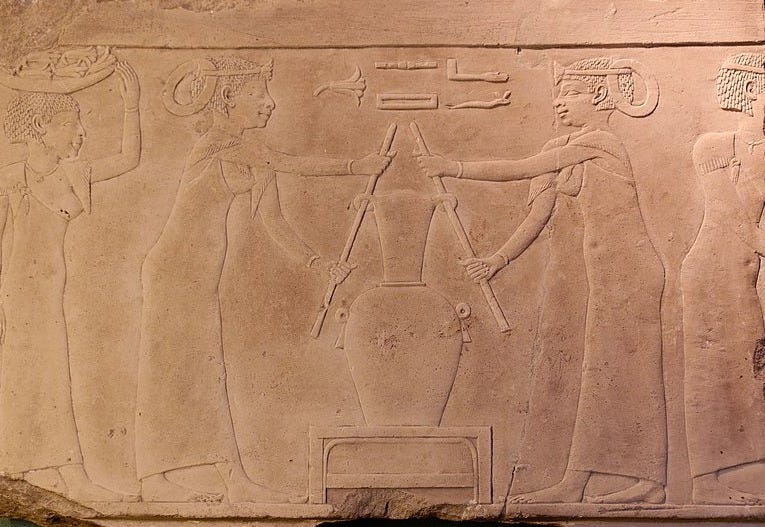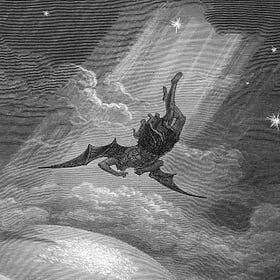Essence of Humanity
Recently I read Perfume: The Story of a Murderer. The main character Grenouille is born and lives without a bodily smell, without a sense of morality, with an extremely heightened sense of smell, and without a moral judgment of various smells. The author compels the reader into this universe where smell is the essence of humanity: others are repulsed by Grenouille because they recognize, most without knowing how, that he is devoid of the human essence, and Grenouille “captures” the essence of his victims by taking their perfume and bottling it. He is even able to manufacture with his perfume skills a simulated sense of humanity which he uses from his bottles to elicit various reactions to himself from others. He delights in his skills and has contempt for human beings for how simply and effortlessly he mimics and dupes them.
The role of perfume—the description of the art of processing countless flowers down to their essence, how the recipes mix a little of several different essences to invoke something beautiful, and what effect the sense of smell can make in interpersonal connections—provoked me to consider what is essential to humanity. I like the challenge of articulating the essence of humanity. It seems like a primary task for a philosopher to be able to describe what is essential, in the Aristotelian sense: what must be contained as a fundamental characteristic. But the task of identifying, describing, and distinguishing primary and secondary is rather elusive, like reverse engineering the recipe for a perfume just from smelling it. What is universal to each human being? What must be contained in a human being in order for them to be considered a human being? How would one describe human being to a computer so that the computer understands that a well trained dog is not a human being, nor is a mythological angel, nor is a well programmed AI? There are some hypotheses from philosophers, but even their work does not escape critique. And here are some hypotheses from me, which of course deserve even more critique.
Base Notes
Potential : Essential to the human condition is the condition of possibility. We are tempted to say “humans are rational animals” or “humans are moral animals”, but opposites are born together, and the potential to rationality or to morality comes with the potential to their negations. So we can also say “humans are irrational” or “humans are immoral”. The negation is even easier to say because humans have the potential to be rational, but are imperfect, so they are irrational; as well humans have the potential to be moral, but are imperfect, so they are immoral. The judgment of degree of rationality or degree of morality are possible because humans have these concepts. The frog does not concern itself with rationality or morality, it just is as it is. Human beings have a sense of reason and a sense of morality. Human beings are potentially rational animals. Human beings are potentially moral animals. Each of the other characteristics of humanity are qualities of potential: they are there, but we can choose the opposite, we can ignore, we can be apathetic.
Striving for : Essential to the human condition is a “striving for”, which takes different forms and different targets, but leads us to fight for, be dissatisfied with, gives us desire towards, motivates us to work for, etc. We want to believe that there is some meaning to life and the universe, so we are creatures of mythos. We write stories, we seek out various perspectives and explanations, we are persuaded, we believe in worldviews much greater than ourselves in order to satisfy some discomfort with the possibility that this life might be all that we have. We want to be greater than just this life, so we create goals, to live just a little more than our eighty odd years. Perhaps we write a book or create artwork that could reach a wide audience and influence their way of being. Perhaps we have children and teach them things and try to make their lives slightly better than what we have. Perhaps we sign treaties or declare wars so that others will say our names long after we die. Frogs do not have the subjunctive mood in their language. Yet we have this idea of should or ought because we know some different state is possible, a different state may be more desirable, and we have the potential to bring about a different state.
Awareness of finitude : Essential to the human condition is an awareness of finitude. This awareness likely gives us anxiety or even fear because of the previous “striving for”: we have a desire to live beyond ourselves, but practical limitations. We need hydration, nourishment, and shelter. These essentials usually require money, so we take employment, participating in society and selling our time and energy in exchange for the means to pay for things. We are restricted by time, which we use some to sell and some to rest and relax, and it only progresses forward. We are limited by the physical: the body and its needs, space and laws of society, movement and practical transportation. Atrophy is rather the direction of progression without some effort. Yet, despite all efforts, we will soon die. No diet, exercise, accomplishment, reputation, book, progeny, scientific advancement, or religion changes this. The frog does not keep a to do list of goals to reach before he dies. Yet we keep an awareness of the calendar, how many years have passed, and how many more we might have. We have bucket lists, fear of missing out, concerns for our social media engagement numbers, stress when we discover a new wrinkle or grey hair, and belief in worldviews that promise something beyond death.
Heart Notes
A sense of reason : We have a sense of reason, a capacity to have ideas, an ability to think, a language to share with each other, a direction of common sense, a faculty to employ these skills with mathematics, sciences, humanities, and arts.
A sense of morality : We have a sense of morality, a fundamental awareness of a difference between good and bad, that it is better to be good than to be bad, and that we should rather be good than bad. We rather feel joy when we choose to be good and guilt and shame when we choose to be bad.
An interest for self : We have an interest in our own self, an instinct for our own survival and an investment in our own self interests before any other interests. We take care of ourself and our own, and then interests that we identify with or that have some effect on us. If someone wants us to care about a cause, they persuade us by offering a narrative of how the cause relates to us.
An interest for society : We have an interest to participate in society, a conscious or unconscious calculation and acceptance that there are rather more benefits than detriments from living among, respecting, sharing with, compromising with, constructing with, and socializing with others. Even poets who idealize solitude visit their mother for homemade cookies and fresh laundry.
A taste for beauty : We have a taste for beauty, a craving to seek out, create, and experience beauty. We enjoy the comforts we know and return to them in order to experience them again. We build our environment to bring us pleasure and minimize ugliness. We create adventure to seek out new forms of beauty from the world around us.
A desire for freedom : We have a desire for freedom, to live as we want and to fight against limitations on our freedom. We take an interest in political life in order to protect the freedoms we have and advocate for the freedoms we seek.
What recipe would you write for the perfume of humanity?
Ontological Vertigo
Vertigo is a disoriented sense of groundlessness. It literally refers to the symptom of dizziness or spinning. But the idea of panic when we are unsure of our stability grounded on something concrete metaphorically describes when we are lost. Lost in our humanity, between dogmatic…
Humanity Sans Frontières
Human beings have great abilities to create our own reality, to choose our own path, to make of our lives what we want. We have conquered many goals, explored around the globe and beyond, discovered scientific truths and interesting ideas. Some achievements are more difficult than others, but we glory in the challeng…







